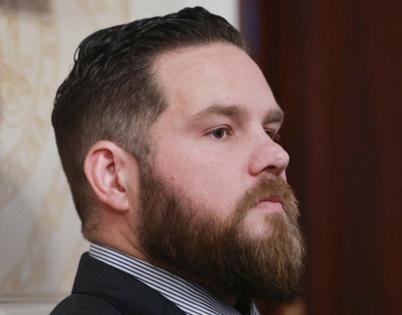Former SC lawmaker accused of sharing child porn kicks lawyers out, will represent himself
Published in News & Features
COLUMBIA, S.C. — Former state Rep. RJ May, who is facing 10 counts of distributing child pornography on the internet, effectively fired his public defender lawyers Thursday and told a federal judge he will represent himself at his trial next month.
The decision by U.S. Judge Cameron Currie to allow May, a Lexington County Republican known for his brash, confident and outspoken manner in the halls of the S.C. State House, means that May’s personality will be unleashed at his upcoming trial as he questions government agents.
Early in the 40-minute hearing, May told Judge Currie he no longer wanted to use Jenny Smith and Jeremy Thompson, both taxpayer supported public defenders, as his attorneys. The hearing took place in the large courtroom on the third floor of the Columbia federal courthouse.
“There is an impasse between myself and Ms. Smith and Mr. Thompson on how to move forward with the motion to suppress (evidence),” May told Judge Currie during the 40-minute hearing as he explained why he wanted to represent himself. Details of what the exact differences were were not discussed in open court.
A hearing on May’s motion to suppress is scheduled for Sept. 24.
May is not an attorney and therefore is presumably unfamiliar with the complicated procedures and rituals in criminal federal court, forums in which only highly qualified lawyers usually practice on all sides. But if a defendant is mentally sound, can assist in his case, and can understand the issues, he is allowed to represent himself.
Before allowing May to represent himself, the judge took him through a series of questions designed to show him the risks of being his own lawyer and to reveal his basic ability to understand the issues.
“I find that you are competent to waive counsel,” Currie said at the end.
However, May will have the assistance of Smith and Thompson in choosing a jury, Judge Currie said. And Smith and Thompson will sit behind May at trial — in a status called “stand by” — so they can answer any questions he may have or clarify statements from the judge.
In another unusual matter, Judge Currie has scheduled the trial to begin Oct. 9. It is expected six trial days, ending Oct. 17, one day before May turns 39.
Most federal criminal cases take months and even years to get to trial. Judges routinely grant delays on requests for delays by both prosecution and defense. However, a defendant has the right to a speedy trial. It appears May has availed himself of that right.
May was arrested June 11.
Federal prosecutor Scott Matthews of the U.S. Attorney’s office did not object to either May’s request to represent himself or to the speedy trial date. Another federal prosecutor, Elliott Daniels, was recently added to the prosecution team.
Matthews told Currie the prosecution plans to have eight witnesses. All will presumably be questioned by May, should he choose. Most or all will likely be law enforcement agents who can testify as to how May was tracked down from anonymous postings on the internet to his house and phone addresses. As such, the trial is likely to be a textbook lesson on how law enforcement hunts alleged child sex predators on the internet.
Another development in Thursday’s hearing was that May will have access to all seven search warrants in the case and their returns in the case.
Information obtained by search warrants served by various law enforcement agencies on Internet providers, AT&T and on May’s house provided crucial evidence that tors investigators to May.
Before and after Thursday’s hearing, May conferred with his former attorneys at their desk. As May left the courtroom, he appeared to be carrying files with him as his wrists were in handcuffs and only briefly looked back to the people in the courtroom who were observing the proceedings.
May, who graduated magna cum laude from University of South Carolina, ran a political consulting business before his arrest. First elected to the S.C. House in 2020, he was a driving force behind the hard line conservative Freedom Caucus, which often drew ire from the rest of the state House for its hardline stands.
©2025 The State. Visit at thestate.com. Distributed by Tribune Content Agency, LLC.







Comments